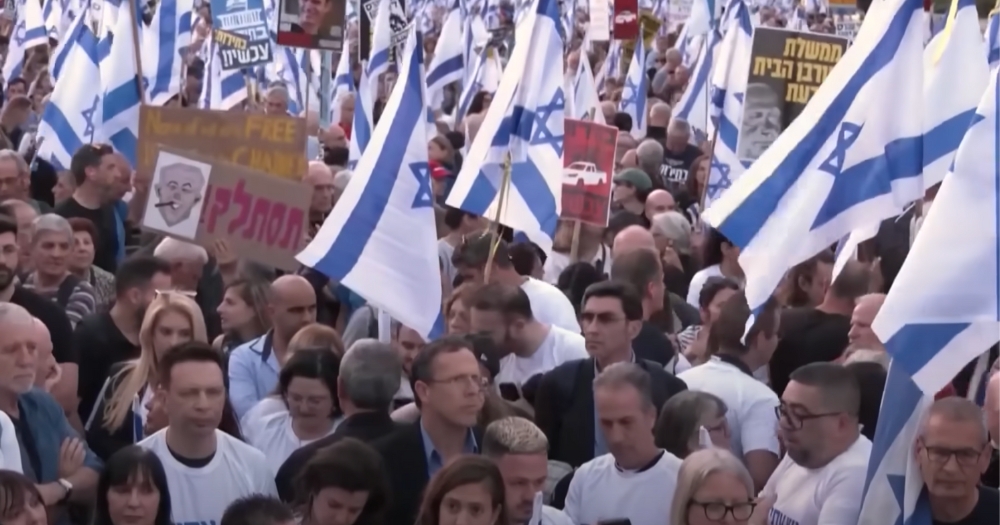Tens of thousands of angry protesters took to the streets across Israel on Mar. 30 and 31, 2024 in what was the largest protests since Oct. 7, 2023.
Angry that Netanyahu's government yet to bring hostages home
The protesters are angry at Israeli Prime Minister (PM) Benjamin Netanyahu and his government for failing to bring home the individuals that Hamas has taken hostage nearly six months ago, according to The Guardian and CNN.
The Palestinian militant group sprung a deadly terror attack in Israel on Oct. 7, 2023, killing at least 1,200 people and taking another 250 or so people hostage.
105 hostages were released during the temporary ceasefire between Nov. 24 and 30, 2023. That was the first and only truce since the Oct. 7 attack.
Israel believes that the remaining 130 or so hostages are still being held in Gaza and 34 are presumed to be dead.
Demanding Netanyahu's resignation
Tens of thousands joined the families of the hostages and marched in Tel Aviv, Jerusalem, Haifa, Be’er Sheva, Caesarea and other Israeli cities.
These protesters have labelled Netanyahu an "obstacle to the deal" that would release the remaining hostages, and demand his resignation.
Hamas put forth a proposal to Netanyahu, saying that it would release the hostages if Israel put an end to the war and withdrew its forces from Gaza.
However, Netanyahu rejected the proposal on Jan. 21.
Hamas, on the other hand, rejected a recent ceasefire proposal and claimed that Israel was ignoring their demands for a permanent ceasefire and for Israeli troops to withdraw from Gaza.
Calling for an early election
As the Israel-Hamas war wages on, the families of the hostages and protesters are moving away from Netanyahu's top goal — to eradicate Hamas — and now just want their family members back home.
They believe that the Israeli government is not sufficiently prioritising the release of hostages as compared to their military or security objectives.
Amid the calls for Netanyahu's resignation, calls are also being made for him to be impeached or for an election to be held now — options that could see Netanyahu removed from power.
Israel's next election is scheduled to take place in October 2026, according to The Times of Israel.
Besides this, protesters are also blaming Netanyahu for Israel's failures on Oct. 7, when Hamas was able to spring an attack on them, and to a devastating extent, making it one of the worst civilian massacres in Israeli history, the Associated Press reported.
During the protests in Jerusalem on Mar. 31, police fired skunk water — a foul-smelling substance — from water cannons to disperse protesters who were blocking Begin Boulevard, the city's major north-south highway, BBC reported.
Netanyahu ruled out early elections, pressing on with Rafah ground offensive
However, protesters have vowed to continue their demonstrations, and appear prepared for it.
CNN observed dozens of protestors camping in tents outside the Knesset, Israel’s parliament, in Jerusalem.
Netanyahu is also under pressure as the Israel supreme court set a deadline for Apr. 1 to end an exemption for military conscription from ultra-Orthodox Jewish men.
The issue is a divisive one for Netanyahu's coalition government, with right-wing parties supporting the exemption and others who wish to see conscription shared more equally among Jewish Israelis.
The government already suffered a blow from the resignation of minister Gideon Saar about a week prior.
Netanyahu addressed the protesters and their demands in a nationally televised speech on Mar. 31, before undergoing hernia surgery.
He rejected calls from protesters for his resignation and ruled out an early election, saying it would stall the hostage talks and paralyse Israel for six to eight months, Deutsche Welle reported.
He also reaffirmed his pursuit for a military ground offensive in Rafah, a southern city in Gaza where around 1 million Palestinians — half of the population — are sheltering.
"There is no victory without going into Rafah," he said, adding that pressure from the United States (U.S.) would not deter him.
The U.S. recently abstained from a United Nations Security Council vote that called for an immediate ceasefire in Gaza, allowing it to pass.
Top image from DW News/YouTube

If you like what you read, follow us on Facebook, Instagram, Twitter and Telegram to get the latest updates.



